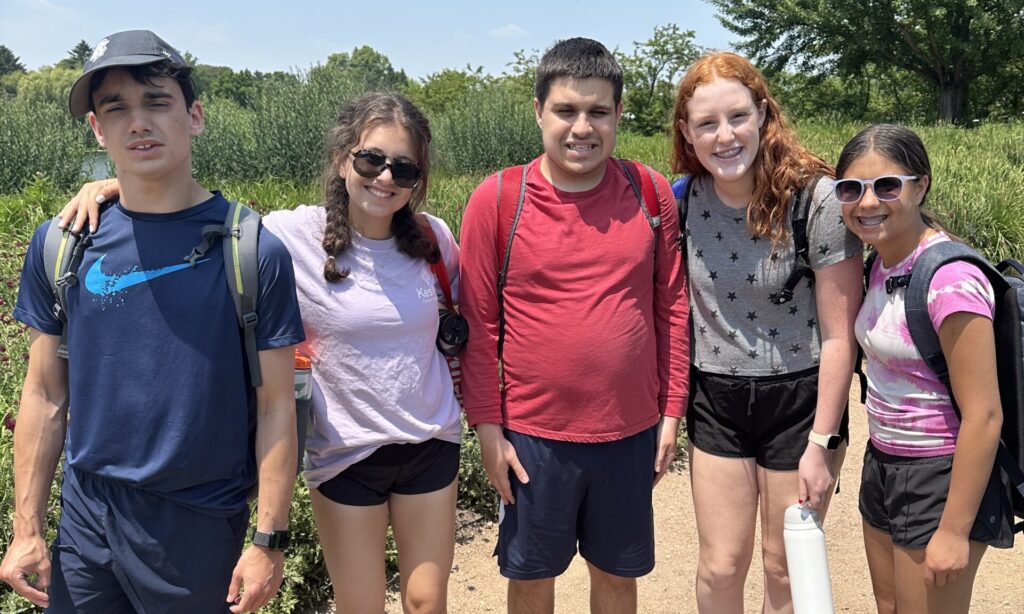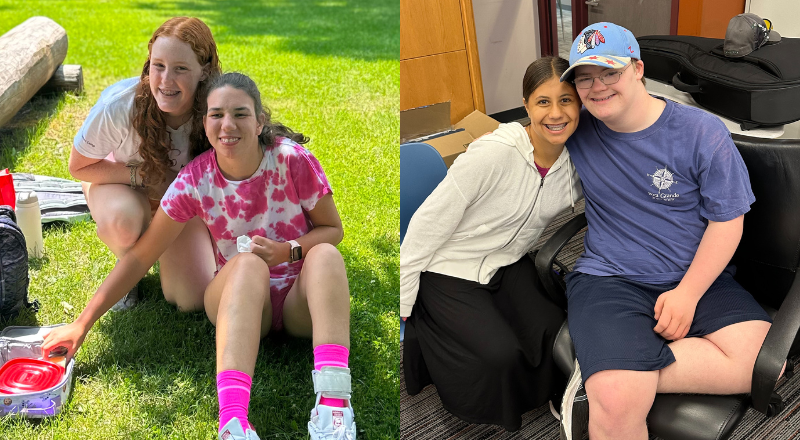Sami Abrams and Lexi Berkowitz, both 13 years old, spent the first half of their summers volunteering at Keshet Teen & Tween Camp. They were both interviewed about their experiences volunteering at camp, some highlights from the summer and the biggest lessons they learned along the way.
How did you first get involved with Teen and Tween? Why did you decide to volunteer there as opposed to other camps?
Lexi: Sami volunteered at Teen and Tween Camp last summer and had an amazing experience. We both needed something to do during the summer before going to overnight camp, so we decided to do it together this year!
Sami: We also had both been familiar with Keshet from going to Apachi and Camp Chi. Because of our interest in working with people with disabilities, Keshet seemed like a good thing for us to do.
Did either of you have prior experience working with people with disabilities?
Sami: Besides working at camp, I’ve also been involved with Special Gifts Theater. I’m looking forward to continuing my involvement with Keshet during the school year and for summers to come!
Lexi: This is my first time working with people with disabilities, but I have loved it so much. I definitely want to get more involved, whether it’s with Keshet or other organizations at my school.
What makes Teen and Tween Camp different from other camps you’ve been to in the past?
Lexi: Coming into this summer, I didn’t know what to expect. Compared to Apachi where things are much more structured, Teen and Tween is much more go with the flow. We also have so much staff support. Especially as volunteers, we never feel like we’re alone and we can always ask for help.
Sami: Teen and Tween Camp is very much focused on the campers and what they can do. If they can’t do it, we are constantly problem-solving as to figuring out what they can do so they can participate. When all the focus is on each different camper, it’s a very different experience.
What has been your favorite part of volunteering at camp?
Sami: I like getting to know all the campers. When you’re one-on-one, you start to learn what you can say to encourage them to participate. Each camper has their own ways of communicating and how they want to be communicated to.
Lexi: As volunteers, we are assigned to different campers each day wherever we are needed. I love getting to form new connections with campers. By working with them in this way, you get to do a little bit of everything which I really like. I also love getting to swim with them and see them try new things.
Sami: I’ve loved how close I’ve gotten with a bunch of the campers and learning new things about them. They get so excited to see me when I get to camp and always give me a big hug. I’m excited to continue to work with campers and staff that I haven’t had a chance to connect with yet.
What are some things you’ve learned through this experience?
Sami: The biggest thing I’ve learned is that there is always a way that someone can do something. Normally when it comes to people with disabilities, many automatically go to this default that they can’t do something. For example, when we go bowling, maybe a camper needs a ramp and maybe they don’t. We shouldn’t just assume that’s what they need.
Lexi: One time when we were bowling one of the campers who has always used a ramp one day said “I don’t need a ramp. I’m good.” And then he got a strike! It’s amazing what they can accomplish when we give them the opportunity to do so.
Sami: You can really tell they get in their heads when other people assume they can’t do something; you can see it on their faces. It really makes you realize just how much you can underestimate their potential. We shouldn’t assume they always need help–we should give them the chance to try it on their own first.
Lexi: Sometimes, I’ve noticed that people tend to group all people with disabilities into the same category. But the truth is they are all different and all have their own needs. They have special things that make them, them.
Tell me about a camper you’ve connected with. What did that look like? How did it make you feel?
Lexi: One day. Sami and I were paired with the same camper. At first, he was always so tired and we would need to take him to the sensory room to relax. With time, he has started opening up more and making jokes with us. We’ve now started to pick up on his little things. He’s slowly starting to get more involved with camp activities and is becoming more excited about them. Transitions can still be challenging but as soon as we get there he’s so excited.
Sami: During the school year, I actually ran into one of the campers at the dentist but didn’t get a chance to say hi. I didn’t know if he saw me or remembered me. Later that day, he messaged me on Instagram to tell me he saw me and asked me if I was coming back that summer. When I said I was, he was so excited and that got me even more excited to come back!
What advice would you give to someone who is thinking about volunteering with Keshet?
Sami: It’s normal to be a little nervous, especially when it’s different from what you know. You may need to change your mindset and adjust your expectations. You need to be okay to adapt if something doesn’t go your way. If a camper doesn’t want to swim, you can do an art project. I would also always assume the best in your campers.
Lexi: My piece of advice is that it’s okay to take breaks and ask for help! Camp can be tiring and stressful at times, so it’s okay to take some time for yourself. And of course, always expect the unexpected!
Although camp is coming to a close, we are looking for some volunteers for the upcoming year. Volunteers start at 6th grade and are needed for after school, sports and Sunday programs. If you want a fun and meaningful way to build friendships, gain valuable experiences, and make a difference in your community, apply to volunteer with Keshet today!


